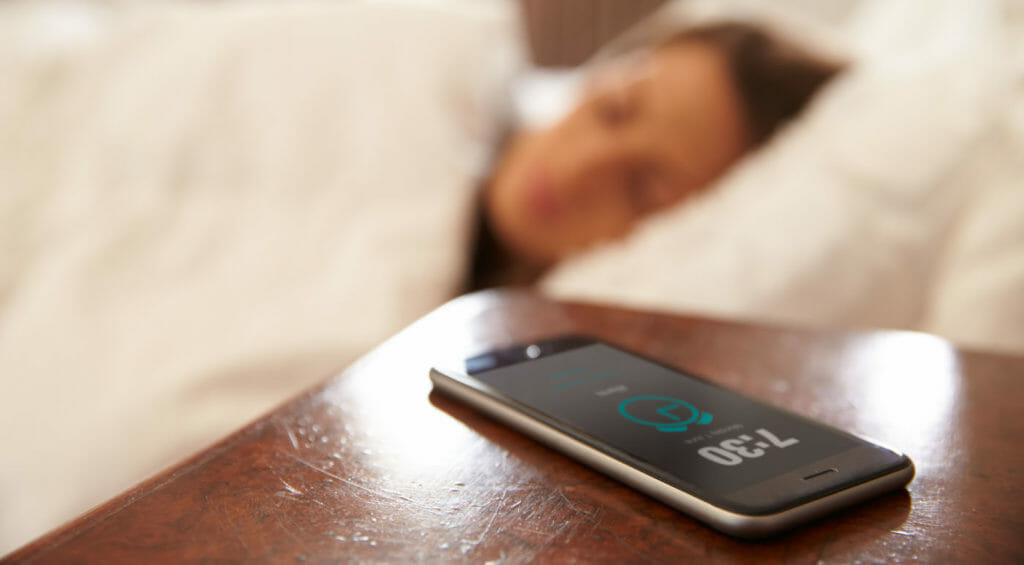
You’ve woken up tired. Again. You add up the number of hours you slept, only to find you’ve met the recommended sleep requirements. The math adds up, but it doesn’t feel like it. It’s time to start your day, but you wish you could go back to sleep!
Maybe you intended to get some early morning exercise, go for a walk, or make a healthy breakfast, but now it feels like your only option is jumping into a giant pot of coffee.
I’m not going to argue with a delicious cup of coffee, but when that energy wears off and you need more just to keep going, you’re left perplexed. Something is missing, that’s clear. But what? A new mattress could help significantly, but there’s probably a lot more to take into consideration as well.
Let’s start by exploring what it means to sleep deeply, and then we’ll get into how to get more deep sleep. There are a few reasons why you may not be sleeping deeply enough, and simple awareness can help simplify the solutions.
What Is Deep Sleep?

While I usually hear people refer to getting deep sleep in a more emotional context, deep sleep is a real, measurable aspect of sleep.
There are essentially three levels of sleep: light, deep, and REM (rapid-eye movement). Under normal conditions, they combine to create 5 stages of sleep that, together, take about 90 minutes to complete.
Deep sleep occurs during stages 3 and 4, and it’s a period of sleep where your body slows down to be repaired. Muscles relax, your heartbeat slows, breathing is gentler, and you become increasingly difficult to wake up—as if the earlier stages were just coaxing you into this real purpose for sleep.
Our bodies experience wear and tear as we go about our day, and deep sleep is what puts us back together again.
REM is technically not deep sleep, but it deserves a mention here because it’s responsible for things like memory consolidation, brain detoxification, and mood regulation. These are all aspects of cognitive functioning that play a part in our emotional interpretation of “deep sleep.”
Fortunately, the conditions needed for getting more deep sleep are the same for achieving REM, since one gives way to the other.
How to Get More Deep Sleep by Getting More Light Sleep
This may sound counterintuitive, but if you are not sleeping deeply, it’s light sleep that could be the problem. An environment that’s not ideal can not only keep you from falling asleep, but also lead to interruptions.
Every sleep interruption in the lighter stages means starting over. And starting over means delaying the arrival of deep sleep.
Building a sleep cycle is a lot like a game of Jenga. When the blocks come crumbling down, you don’t get to pick up from where you left off. This only needs to happen a few times to miss out on an entire cycle of sleep.

Keep in mind that this could be happening (and probably does happen) without your awareness. If you’ve ever slightly woken a partner by getting into bed while they were sleeping or had a conversation with them they didn’t remember, those are examples of somebody’s Jenga tower crumbling down without them knowing.
When we start thinking of sleep in terms of cycles instead of hours, our awareness of deep sleep increases. And this increases our understanding of how to influence it, respect it, and create the environment it needs to flourish. In other words, if you understand deep sleep better, you can better understand how to get more deep sleep.
Darkness Is the Primary Condition Required for Deep Sleep
Darkness induces the release of melatonin, the hormone that allows sleep to proceed through all the stages, uninterrupted. The presence of light during sleep is a scratch on a record.
Blackout curtains are a simple way to create the ideal environment to help you get more deep sleep, and when set up properly they should prevent you from being able to see your own hand a few inches from your face.
Also, know that not all light is visible. Frequencies emitted by electronic devices are invisible to the eye but still recognized by the body’s master-clock as blue light, which is highly detrimental to sleep.
Disconnecting Wi-Fi and putting your electronics on “airplane mode” will not only disable your devices from emitting harmful electromagnetic frequencies, but keep them from communicating with each other and broadening their scope.
Temperature Is a Key Factor in Getting More Deep Sleep

Body temperature will dip, and then rise, as sleep and wakefulness naturally occur. A cooler room will help account for these natural changes in body temperature so you don’t “heat up” too quickly before it’s time to wake up for the day.
If you’ve ever boiled food and had the ingredients spill too quickly over the top of the pot, this is similar to what happens when your room isn’t cool enough. The suggested temperature for sleeping is between 60 and 67 degrees Fahrenheit, but the coolest you can get it while still feeling comfortable is the best way to make it to the end of sleep uninterrupted.
Maintaining an ideal environment is important, but it doesn’t create deep sleep—it just allows it.
There are a few more things you need to know to set yourself up to get more deep sleep.
Deep Sleep is Created During the Day
Deep sleep is an important aspect of the circadian rhythm, a biological process managed by our brain’s computer that initiates many healing and regenerative tasks in our cells and tissues. Just like any computer, our ability to carry out these tasks depends on proper programming.
This programming comes from sunlight. Even though we typically experience sleep as an unconscious nighttime event, sleep is a 24-hour process, where during the day we collect the important ingredients we need to be rebuilt at night.
Deep Sleep Starts with Melatonin
Melatonin is the most important ingredient for sleep. The more we have, the better positioned we are to cycle through the sleep stages at night.
Melatonin is made when sunlight reaches the eye’s surface—which is great, because this gives us a great deal of control over our sleep. But it can also be challenging, since living in the modern world for most people means living indoors, out of sunlight.
If you’re reading this you are likely “most people,” so knowing the best times to get sunlight is one way of overcoming this particular challenge.

Early morning sunlight is important because it gives us a head start with melatonin production, and morning light signals the pituitary gland to carry out the appropriate hormonal messages to support wakefulness. The faster we wake up, the more able we are to sleep when darkness arrives. This process is instrumental to getting more deep sleep.
Melatonin is a circadian response. Its production is cued mostly by the timeline of light and darkness. We are on its schedule—it’s not on ours.
How to Get More Deep Sleep when It Counts
We need to go through a series of sleep cycles, usually five or six, in order to feel regenerated. The relationship between sunlight and melatonin tells us when this sleep should occur, which is a few hours after darkness until the onset light.
If this sounds challenging, it doesn’t have to be. The great news is there are things you can do to get more deep sleep, even though you live in a world that isn’t as sleep-friendly as it used to be.
Get more sunlight.
Early morning sunlight is important, but so is getting enough sunlight exposure when UV light is present later in the day. That will maximize your melatonin production. Following this with infrared light at sunset will help you get the most out of sunlight and set you up best for deep sleep.
Use infrared therapy.
If the recipe above is not possible, the next best option is infrared therapy. While nothing can compete with natural sunlight, infrared technology has come close to duplicating this frequency present in sunlight and can be extremely helpful with getting deeper sleep.
Block blue light.
Remember, darkness is key. Blue light emitted from overhead lights and electronic devices may seem harmless, but the brain doesn’t think so. Blocking blue light with blue-blocker glasses is a critical factor to get right because these days, nothing can disrupt deep sleep faster than blue light, and nothing can protect deep sleep better than blocking it.
Additional Resources on Common Sleep Questions
- How Long Is a Sleep Cycle?
- How Many Hours of Sleep Should You Get?
- How Much REM Sleep Do You Need?
- How Much Sleep Is Too Much?
- How to Fix Sleep Schedule
- Sleep Hacks Based on Science
- Hypnosis for the Struggling Sleeper
- Sleep Tips: The Complete Guide to a Better Night’s Sleep
- What Is the Best Temperature for Sleep?